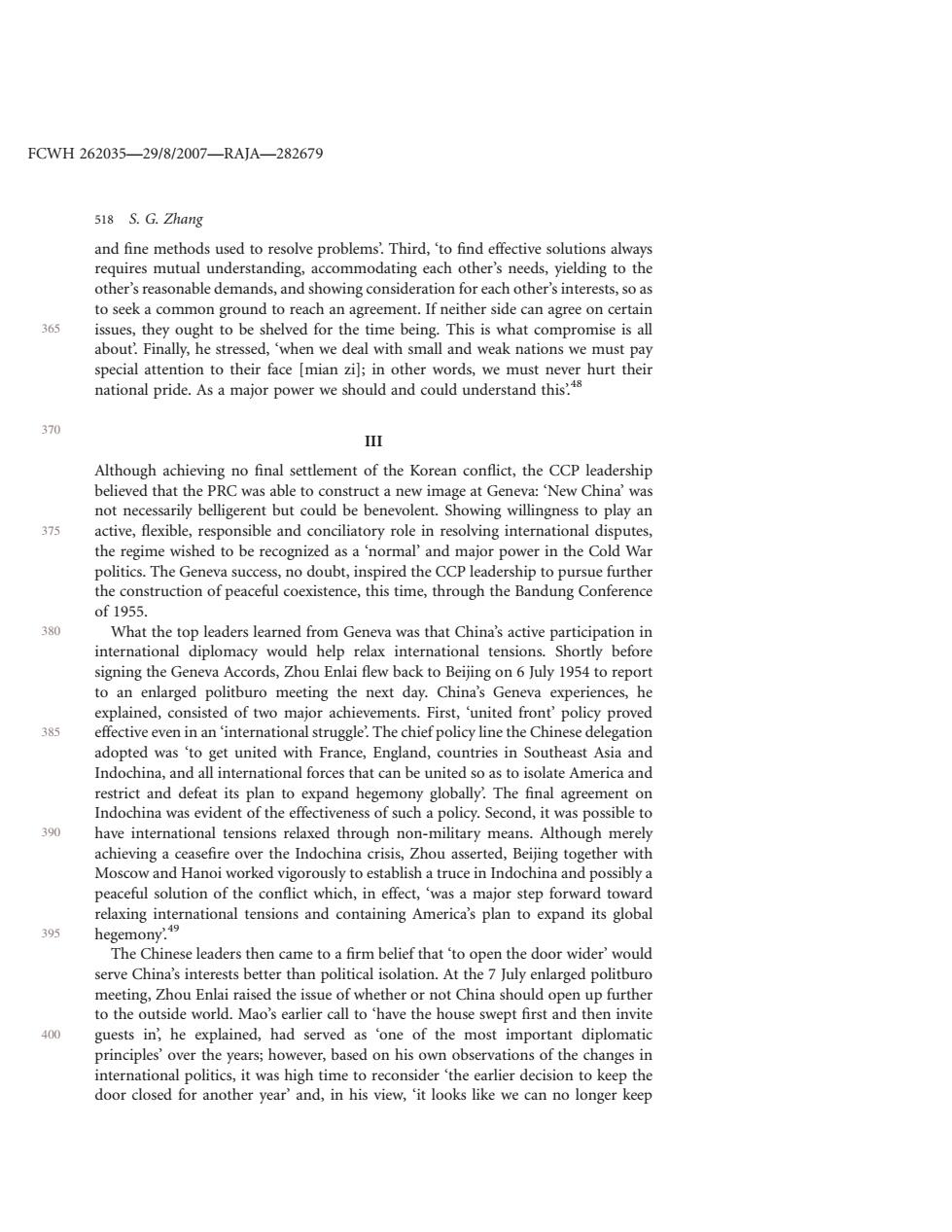正在加载图片...

FCWH262035-29/8/2007-RAJA-282679 518 S.G.Zhang and fine methods used to resolve problems.Third,'to find effective solutions always requires mutual understanding,accommodating each other's needs,yielding to the other's reasonable demands,and showing consideration for each other's interests,so as to seek a common ground to reach an agreement.If neither side can agree on certain 365 issues,they ought to be shelved for the time being.This is what compromise is all about.Finally,he stressed,when we deal with small and weak nations we must pay special attention to their face [mian zi];in other words,we must never hurt their national pride.As a major power we should and could understand this:4s 370 III Although achieving no final settlement of the Korean conflict,the CCP leadership believed that the PRC was able to construct a new image at Geneva:'New China'was not necessarily belligerent but could be benevolent.Showing willingness to play an 375 active,flexible,responsible and conciliatory role in resolving international disputes, the regime wished to be recognized as a 'normal'and major power in the Cold War politics.The Geneva success,no doubt,inspired the CCP leadership to pursue further the construction of peaceful coexistence,this time,through the Bandung Conference of1955. 380 What the top leaders learned from Geneva was that China's active participation in international diplomacy would help relax international tensions.Shortly before signing the Geneva Accords,Zhou Enlai flew back to Beijing on 6 July 1954 to report to an enlarged politburo meeting the next day.China's Geneva experiences,he explained,consisted of two major achievements.First,'united front'policy proved 385 effective even in an international struggle.The chief policy line the Chinese delegation adopted was to get united with France,England,countries in Southeast Asia and Indochina,and all international forces that can be united so as to isolate America and restrict and defeat its plan to expand hegemony globally.The final agreement on Indochina was evident of the effectiveness of such a policy.Second,it was possible to 390 have international tensions relaxed through non-military means.Although merely achieving a ceasefire over the Indochina crisis,Zhou asserted,Beijing together with Moscow and Hanoi worked vigorously to establish a truce in Indochina and possibly a peaceful solution of the conflict which,in effect,'was a major step forward toward relaxing international tensions and containing America's plan to expand its global 395 hegemony:49 The Chinese leaders then came to a firm belief that 'to open the door wider'would serve China's interests better than political isolation.At the 7 July enlarged politburo meeting,Zhou Enlai raised the issue of whether or not China should open up further to the outside world.Mao's earlier call to have the house swept first and then invite 400 guests in,he explained,had served as 'one of the most important diplomatic principles'over the years;however,based on his own observations of the changes in international politics,it was high time to reconsider 'the earlier decision to keep the door closed for another year'and,in his view,'it looks like we can no longer keepand fine methods used to resolve problems’. Third, ‘to find effective solutions always requires mutual understanding, accommodating each other’s needs, yielding to the other’s reasonable demands, and showing consideration for each other’s interests, so as to seek a common ground to reach an agreement. If neither side can agree on certain issues, they ought to be shelved for the time being. This is what compromise is all about’. Finally, he stressed, ‘when we deal with small and weak nations we must pay special attention to their face [mian zi]; in other words, we must never hurt their national pride. As a major power we should and could understand this’.48 III Although achieving no final settlement of the Korean conflict, the CCP leadership believed that the PRC was able to construct a new image at Geneva: ‘New China’ was not necessarily belligerent but could be benevolent. Showing willingness to play an active, flexible, responsible and conciliatory role in resolving international disputes, the regime wished to be recognized as a ‘normal’ and major power in the Cold War politics. The Geneva success, no doubt, inspired the CCP leadership to pursue further the construction of peaceful coexistence, this time, through the Bandung Conference of 1955. What the top leaders learned from Geneva was that China’s active participation in international diplomacy would help relax international tensions. Shortly before signing the Geneva Accords, Zhou Enlai flew back to Beijing on 6 July 1954 to report to an enlarged politburo meeting the next day. China’s Geneva experiences, he explained, consisted of two major achievements. First, ‘united front’ policy proved effective even in an ‘international struggle’. The chief policy line the Chinese delegation adopted was ‘to get united with France, England, countries in Southeast Asia and Indochina, and all international forces that can be united so as to isolate America and restrict and defeat its plan to expand hegemony globally’. The final agreement on Indochina was evident of the effectiveness of such a policy. Second, it was possible to have international tensions relaxed through non-military means. Although merely achieving a ceasefire over the Indochina crisis, Zhou asserted, Beijing together with Moscow and Hanoi worked vigorously to establish a truce in Indochina and possibly a peaceful solution of the conflict which, in effect, ‘was a major step forward toward relaxing international tensions and containing America’s plan to expand its global hegemony’.49 The Chinese leaders then came to a firm belief that ‘to open the door wider’ would serve China’s interests better than political isolation. At the 7 July enlarged politburo meeting, Zhou Enlai raised the issue of whether or not China should open up further to the outside world. Mao’s earlier call to ‘have the house swept first and then invite guests in’, he explained, had served as ‘one of the most important diplomatic principles’ over the years; however, based on his own observations of the changes in international politics, it was high time to reconsider ‘the earlier decision to keep the door closed for another year’ and, in his view, ‘it looks like we can no longer keep FCWH 262035—29/8/2007—RAJA—282679 518 S. G. Zhang 365 370 375 380 385 390 395 400